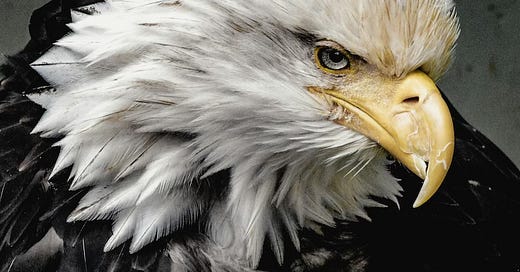I've heard very few words of advice in life that fall into the category of “Hell, yes, that helps in challenging times.”
Of the hundreds of people I’ve interviewed, hundreds more books I’ve read, and too many therapists I’ve consulted, most advice lands in the watching Netflix camp: engaging at the moment but entirely forgettable.
One of the few exceptions came two years ago.
It was at the tail end of COVID and in the midst of what people called a “Snowmageddon.” Almost 60 feet of snow fell where I live—often a foot a day for days and months on end.
December was fun. January felt like a lot of work. February started to get scary. Alerts came over my phone: “Watch for sudden roof collapse.” How one does that, I had no idea. A tree went through a neighbor’s roof. Another neighbor’s house collapsed entirely.
At the same time, my youngest son had a freeride ski competition in Canada. He was 18, and this was his first season competing as an adult. Freeride is similar to Olympics freestyle skiing, where athletes do tricks on 22-feet high halfpipes.
One difference is that, in freeride, skiers use the natural features of a mountain. (Think flips off cliffs.) And, unlike the Olympics, they don’t get to practice on the features in advance.
My son, an extreme athlete from a very young age, has done this for years, which has turned me into someone who prays, at least when I see what he is doing.
But this time, I couldn’t be there for his competition—among other reasons, because of the threat of sudden roof collapse. So, I prepared myself to watch over Livestream, hoping against hope that the ongoing heavy snowfall wouldn’t make the power go out.
Then I got a text. It was from the mom of another skier who was not competing that day.
“How are you?” she asked.
“Nervous!” I responded.
She understood. Her son had once seriously injured himself in competition.
“I guess all we can do,” she said, “is have faith that we’ll be able to handle whatever happens.”
Bam. That landed. It was not a Pollyannaish “Everything will be all right” response. And it was not a “Yeah, I’m going to check out” diversion from reality.
It was truth and wise intention combined.
Today, as we stand on the precipice of a new and deeply concerning new chapter in America, I find that a helpful mindset. The short version being this thing I’ve said to myself during moments in which I am absolutely terrified: “I got this.”
“I got this” or “We got this” does not mean life will bend itself to meet our wishes. It does not mean we will not be overwhelmed with fear or sadness, grief or anger. It does not mean bad things won’t happen.
But it does mean planting a flag of belief in ourselves, in the integrity of defending what is right and good and just, and in the truth that we can grow instead of shrink in the face of challenges.
A bit more concretely, it means we can set our intention to respond to what tomorrow and beyond bring with courage, altruism, and integrity—the guiding values of ordinary heroism in these extraordinary times.
Of course, we can never rise to challenges—in sports, mission-driven work, or any other good thing in life—with aspiration alone. Skills and practice are also required, as is relevance to the particular challenges at hand. Put another way, moving from negative setbacks to positive impact will be a journey indeed. But we got this!
Having spent decades studying how people rise to great challenges, I’m looking forward to sharing the most valuable insights I’ve learned with good people doing hard things in 2025.
Please reach out if you’d like to learn more about my talks, coaching, or workshops.





I have a tattoo that says, "Faith over Fear" which exactly mirrors the mindset of this post. Thanks for your reminder.